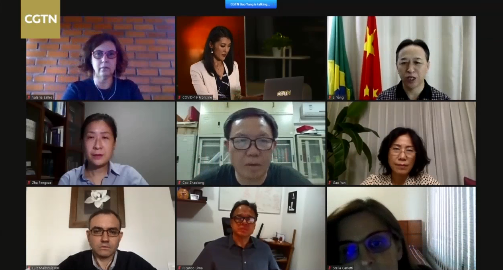Peking University, May 28, 2020: As the coronavirus pandemic continues to wreak havoc around the globe, Brazil is seeing an overwhelming spike as the country reported over 291,500 confirmed COVID-19 cases as of Thursday, overtaking the UK to become the third-most in global infections.
In the latest episode of CGTN's "COVID-19 Frontline" livestream, which was held on Wednesday, May 20, CGTN invited three veteran experts from Peking University People's Hospital who specialize in pulmonary and critical care medicine, infectious disease, and intensive care medicine, to exchange treatment experience with Brazilian peers.

Li Yang, consul general of the Chinese Consulate-General in Rio de Janeiro, also joined the online meeting and sent his greetings through the program. "Stay together, work together, hand in hand, to fight against this deadly virus, and I believe this video conference is part of our joint efforts. We firmly believe that eventually we will defeat this common enemy of the entire mankind," he said.
Treatment for COVID-19 patients with cardio-cerebrovascular complications
Ricardo Lima, chief of the Intensive Care Unit and head of the COVID-19 Project at Hospital Samaritano, said he had seen many cardio-cerebrovascular complications in Brazilian COVID-19 patients, so he would like to know the treatment experience of Chinese doctors.
Zhu Fengxue, deputy director of Department of Critical Care Medicine, Peking University People's Hospital, said the mechanics behind these heart injuries are not clear currently, but it might be related to ACE2 (angiotensin-converting enzyme 2) receptors. It also might be triggered by an inflammatory response or drugs. For this group of patients, the alleviated level of myocardial enzymes can be noticed. In terms of clinical therapies, there is no particular treatment for this kind of complication. Doctors can only try to eliminate the triggers by not aggravating the damage to the heart. There is no special therapy. The mortality rate in this group of patients is very high.
 At the online meeting
At the online meeting
Use of antibiotics
Valeria Salles also asked about the use of antibiotics at different stages.
Dr. Cao Zhaolong said, at present, COVID-19 patients with mild symptoms don't receive antibiotics. But for severe cases, they need to get prophylactic antibiotics. The most commonly used antibiotics to treat severe COVID-19 patients include levofloxacin, moxifloxacin, second generation cephalosporin and third generation cephalosporin. Carbapenem can be used to treat ICU patients.
The use of ECMO
Luiz Malbouisson, professor of Anesthesiology at the University of Sao Paulo Medical School, asked about the use of ECMO (Extracorporeal membrane oxygenation) and when to use it?
Zhu Fengxue said when intubation is not working efficiently on severe patients, the ECMO will be applied. Such as when the oxygen index is lower than 100 and plateau pressures are greater than 35 cm H2O. But if the patient's condition deteriorates dramatically, ECMO will still be applied.
Although ECMO has all sorts of problems, such as catheter-related infections and bleeding problems, overall, in the treatment of COVID-19, ECMO treatment shows a good result. Some severe patients, who got treated with ECMO, have survived.
Potential effects of COVID-19 on the health of recovered patients
Valeria Salles, chief of International Office of Hospital Samaritano, Brazil, asked about the potential lung damage of recovered COVID-19 patients.
Cao Zhaolong, head physician of Department of Pulmonology and Critical Care Medicine, Peking University People's Hospital, said that according to his treatment experience, 80 percent of COVID-19 patients have mild symptoms, they can do some exercises in the hospital and their respiratory systems are not affected much by the virus. After these patients are discharged from the hospital, they can live just like a healthy person. But for critical patients, they are not suggested to do much exercises after being discharged. Because the virus has not only damaged their lungs, but has also damaged their hearts, kidneys and coagulation system, they are suggested to not exercise for at least three to six months. The strenuous exercise may cause sudden cardiac death.
In later episodes of "COVID-19 Frontline," more frontline doctors and experts from Wuhan will join in to share their experience with their colleagues from other parts of the world. If you have any questions regarding COVID-19, you can share it with us using #MyOpinionOnCOVID19 on Facebook.
Source: CGTN

